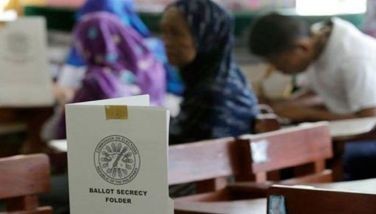Tancangco faces graft raps over voters’ ID
June 25, 2005 | 12:00am
A retired official of the Commission on Elections (Comelec) was indicted on graft charges before the Sandiganbayan yesterday for allegedly approving the proposed P6.5-billion voters’ identification system in 2000 despite the shortage of government funds.
Former commissioner Luzviminda Tancangco, who used to head the poll body’s bidding committee, was held liable by Ombudsman Simeon Marcelo for "giving unwarranted benefits" to Photokina Marketing Corp., the private firm tasked with printing the voters’ ID cards.
The amount she allegedly approved was way beyond the P1.2-billion budget allocated for the project, which was supposed to print the IDs of some 36 million voters.
Tancangco earlier argued that she could not be held criminally liable for the contract because it was never implemented and was, in fact, nullified by the Supreme Court. She said no government funds were lost and that no damage was done to anyone.
Government investigators pushed through with the indictment, however, highlighting Tancangco’s decision in another bidding - this time involving a system for automated counting and consolidation of results — where she thumbed down the contract because it exceeded the Comelec’s budget.
The Ombudsman’s investigators said she showed her "manifest partiality" when she made "no objection" to the mandatory injunction issued by the Quezon City regional trial court, which ordered the resumption of negotiations between the Comelec and Photokina.
Photokina sued Comelec for damages before the lower court after a majority of commissioners refused to approve the deal to which Tancangco had earlier given the green light. The court granted Photokina affirmative relief, forcing the Comelec to elevate the case to the SC, where it eventually won.
Graft investigator Joaquin Salazar recommended a bail of P30,000 for Tancangco’s temporary liberty. The indictment was approved by Orlando Casimiro, deputy Ombudsman for the military.
National Movement for Free Elections secretary general Guillermo Luz filed the complaint against Tancangco after the group failed to have her impeached. Namfrel said she was responsible for Comelec’s failure to use automated counting in the May 2001 polls.
Namfrel also complained that Tancangco, who is at odds with its chairman Jose Concepcion, "prioritized and devoted her efforts to promoting an overly sophisticated voters’ registration and identification project."
They said Tancangco managed to convince Comelec to reorganize its priorities so that voter registration ranked first while the canvassing and automated counting machines became the poll body’s second and third priorities.
Former commissioner Luzviminda Tancangco, who used to head the poll body’s bidding committee, was held liable by Ombudsman Simeon Marcelo for "giving unwarranted benefits" to Photokina Marketing Corp., the private firm tasked with printing the voters’ ID cards.
The amount she allegedly approved was way beyond the P1.2-billion budget allocated for the project, which was supposed to print the IDs of some 36 million voters.
Tancangco earlier argued that she could not be held criminally liable for the contract because it was never implemented and was, in fact, nullified by the Supreme Court. She said no government funds were lost and that no damage was done to anyone.
Government investigators pushed through with the indictment, however, highlighting Tancangco’s decision in another bidding - this time involving a system for automated counting and consolidation of results — where she thumbed down the contract because it exceeded the Comelec’s budget.
The Ombudsman’s investigators said she showed her "manifest partiality" when she made "no objection" to the mandatory injunction issued by the Quezon City regional trial court, which ordered the resumption of negotiations between the Comelec and Photokina.
Photokina sued Comelec for damages before the lower court after a majority of commissioners refused to approve the deal to which Tancangco had earlier given the green light. The court granted Photokina affirmative relief, forcing the Comelec to elevate the case to the SC, where it eventually won.
Graft investigator Joaquin Salazar recommended a bail of P30,000 for Tancangco’s temporary liberty. The indictment was approved by Orlando Casimiro, deputy Ombudsman for the military.
National Movement for Free Elections secretary general Guillermo Luz filed the complaint against Tancangco after the group failed to have her impeached. Namfrel said she was responsible for Comelec’s failure to use automated counting in the May 2001 polls.
Namfrel also complained that Tancangco, who is at odds with its chairman Jose Concepcion, "prioritized and devoted her efforts to promoting an overly sophisticated voters’ registration and identification project."
They said Tancangco managed to convince Comelec to reorganize its priorities so that voter registration ranked first while the canvassing and automated counting machines became the poll body’s second and third priorities.
BrandSpace Articles
<
>
- Latest
- Trending
Trending
Latest
Trending
Latest
Recommended






























